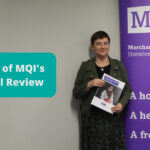
October 10th is World Mental Health Day. The overall objective of World Mental Health Day is to raise awareness of mental health issues around the world and to mobilise efforts in support of mental health.
Homelessness is a traumatic experience and can lead to a host of mental health issues such as anxiety, depression, and deepening substance use. Homelessness can also exacerbate existing mental and physical health issues. At MQI, our Mental Health Team provides symptom management plans, risk assessments, and connections to the HSE’s Homeless Health Link Team. In 2021, the Mental Health Service was able to support 233 individuals with a total of 3,444 interventions. Our team expanded in 2021, adding a part-time Mental Health Nurse.
Orla Condren is the Clinical Nurse Manager at our Riverbank Open Access Centre, overseeing and supporting our Mental Health team and the clients who access our services.
Hi Orla, who are the clients you work with?
Our client base consists of people from different backgrounds. But predominantly, our clients would be homeless and many would suffer with addiction issues and mental health issues. I’ve worked with this population for many years now. Our clients are so marginalised, and what people forget is they are people too. Many of these clients have ended up in homelessness because of everyday stuff that could happen to you or me; a relationship broke down and they couldn’t afford to rent any longer, or they lost their job. They’re a wonderful group to work with, and it’s an honour to get to know and support them. It’s so rewarding to be able to help people.


What are some of the main issues faced by the clients you support?
When a person becomes homeless, their mental health can slip very quickly. If you’re homeless, you can lose all sense of financial planning, of what a normal relationship is, you’re not able to cook for yourself, your sense of dignity can be affected because of how you are having to live and how people treat you in the street. On top of losing those life skills, you’re also dealing with a lot of fear, anxiety and insecurity about where you’re going to sleep that night, how you’re going to get phone credit to call your kids, and so on.
We would see a lot of dual diagnosis, people who have been diagnosed with both a mental health problem and an addiction. This can make it hard for them to access mental health support, as many places won’t treat mental health issues until the person has their addiction under control. It’s very hard for someone to enter recovery when they’re still homeless and dealing with the issues that may have led to their addiction in the first place. That’s why our mental health team here at Riverbank needs to be strong. Another issue faced by our clients who are homeless is that by nature of being homeless, they move around a lot, so they don’t fall under the remit of a specific mental health team and it can be hard for them to access consistent care.
We would see a lot of dual diagnosis, people who have been diagnosed with both a mental health problem and an addiction. This can make it hard for them to access mental health support.
What are some of the most common mental health issues that our clients face?
Anxiety and depression are the big ones. It’s understandable. Apart from anything else, the uncertainty and insecurity of not knowing where you’re going to sleep from night to night can cause people to develop huge anxiety, and to feel really low. We often see people coming in and stating that they have suicidal ideation but when you break it down with them, what they’re actually looking for is practical support. Issues build up and seem unmanageable when you’re homeless, especially if you’re suffering with your mental health, and people often cannot see a way out. But when they come in here, our team is ready to talk them through what they need and how to approach tackling the problems that have arisen. Sometimes it’s as simple as sorting someone a hostel for the night and just listening to what they have to say. Of course we do see clients with severe mental health concerns, such as schizophrenia and psychosis, and we support them here while linking in with external supports as well to make sure they are taken care of.
What mental health supports are offered at Riverbank?
We have a mental health nurse, we’ve got two mental health case workers, and we’ve also got a mental health counsellor. So we’ve got a nice robust system. Our mental health nurse works alongside our GP to help clients with the medical side of treating mental health problems- so getting clients diagnosed and on the correct medication plan. Then our mental health case workers work with clients on a more practical level- helping them to tackle the issues in their lives that might be impacting their mental health, whether that’s housing insecurity, addiction, etc. They’ll help clients take steps towards securing housing, or accessing community detox, or whatever it is they need. Our mental health counsellor will speak with clients around their emotional state, give them the time and space to work out what it is that they’re feeling and why they’re feeling that way. Many of our clients are very marginalised, and they don’t get the chance to sit down and chat about what’s going on for them very often, so making sure they feel comfortable and at ease enough to do that is a key part of our work here.
We are still dealing with the effects of COVID isolation and anxiety on our clients.
How has COVID affected the mental health of our clients?
Hugely. Now, to be fair, you could say that about the general population, but I think with our clients, the isolation became complete. Pre-COVID, at least there was some visibility. But during COVID, people who are homeless became so much more isolated. There was much more anxiety and fear. While many people were accommodated temporarily, in many instances this exacerbated mental health issues or addiction issues, because they were entirely alone, with no distraction and in many cases, limited access to the substance they were addicted to. We are still dealing with the effects of COVID isolation and anxiety on our clients.
And have you met a client recently whose story stands out to you?
There is one client who has had a remarkable journey. He was homeless, and as a result of the trauma he’d endured had a serious addiction problem, his mental health deteriorated hugely to the point of psychosis. He was linking in with our Riverbank team, who worked with the hospital to get him the help he needed. He spent time in hospital being treated, and once his mental health stabilised, our team worked to get him into a rehabilitation facility. He’s now drug-free, in independent living, and has taken up running and swimming. He wants to go to college and work in the social care sector.
When you see these sorts of successes, it makes you feel so invested in the work. People can get out and move on from suffering the ill-effects of homelessness. It is very difficult, but it is possible. Every day, I learn something new from the clients I work with.
Our Mental Health team are present in our Riverbank Building, 13-14 Merchants Quay, from Monday to Friday, and on Sundays.

